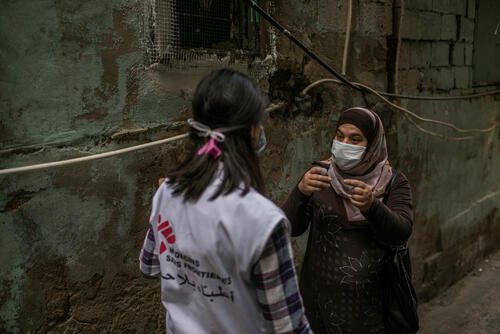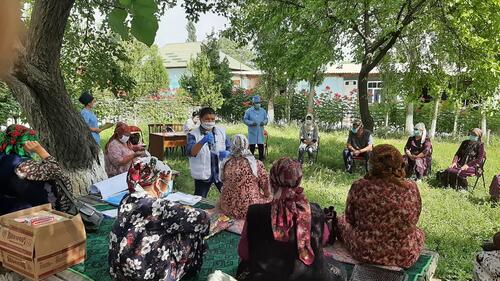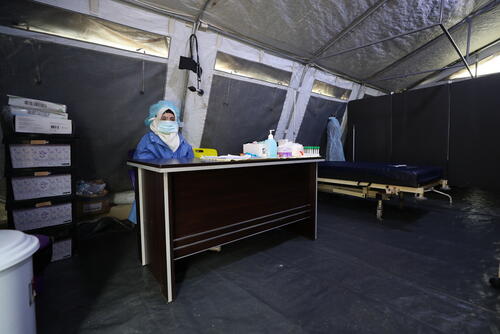Médecins Sans Frontières (MSF) International President Dr Christos Christou delivered the following speech at the 2020 United Nations Economic and Social Council (ECOSOC) Humanitarian Affairs Segment high-level panel on the increasing complexity of health challenges in humanitarian contexts.
“Thank you, Your Excellency, Vice-President of ECOSOC, and Under-Secretary Lowcock for the invitation.
MSF teams are treating patients all over the world: my words today come from their experiences.
This pandemic has brought suffering, fear, and death to populations everywhere. But its impact is not shared equally.
Many of the most vulnerable have already suffered terribly due to a lack of State investment in healthcare for all. Others are living through conflicts, witnessing the erosion of International Humanitarian Law.
As humanitarian teams have been partially evacuated and not replaced, those reliant on aid, and those suffering from neglected diseases, are suffering disproportionately.
Others have been forced to flee their homes; forced to navigate a world where conventions protecting refugees, asylum seekers and internally displaced people are frequently disregarded, and where little consideration is given to migrants.
This pandemic has brought suffering, fear, and death to populations everywhere. But its impact is not shared equally.Dr Christos Christou, MSF International President
Today, we must acknowledge that this pandemic comes after years of questioning humanitarian assistance and principles, and innumerable cases of violence against health workers and facilities.
One of the terrible paradoxes now, is that the very governments that have created conditions in which the vulnerable are left disproportionately exposed to COVID-19, are the same governments who are now making calls for solidarity and cooperation.
Whilst money is vital, financial contributions alone cannot fix healthcare inequality and exclusion. Use your influence, your power, your domestic and foreign policy, to bring healthcare for all.
The COVID crisis amplifies and deepens existing inequalities. MSF sees this on the frontline every day.
Healthcare for all people: without excluding the homeless or undocumented migrants, the prisoners, or indigenous people. They have all been terribly affected by COVID, as have the elderly in many countries.
MSF is committed to caring for all of these groups, but governments must step up and recognise their own responsibilities. You have a duty to ensure no one is excluded from healthcare, and you will not be safe from the virus until you fulfil it. And that means marginalised communities too.
You have a duty to ensure no one is excluded from healthcare, and you will not be safe from the virus until you fulfil it.Dr Christos Christou, MSF International President
Healthcare workers all around the world are risking their lives to provide care. Today, we are still facing serious shortages of basic protective equipment. Without proper PPE, we cannot protect our staff and patients.
In addition to safety, we need access to those at most need, and essential medical tools like oxygen and testing.
In Yemen, COVID is compounding the existing problems caused by the conflict and collapsing health system, and the man-made tragedy that has unfolded there.
Our work is being greatly diminished by the failure to allow access to patients. Restrictions imposed by governments – limiting the movement of equipment, staff, and patients – are constricting the care we can provide. Even when we have some access to patients, we often lack supplies; even when we have supplies, we are often unable to protect our staff. Our staff are often forced to make choices about care that no one should have to make.
To treat COVID in Yemen, like in some other countries, is to treat a crisis within a crisis.
Our work is being greatly diminished by the failure to allow access to patients. Restrictions imposed by governments... are constricting the care we can provide.Dr Christos Christou, MSF International President
In some areas we have been able to adapt and innovate the way we deliver care, maintaining a limited and reduced service for our patients.
But elsewhere, such as at our paediatric surgery operation in Monrovia, Liberia, we have had been forced to suspend our work. Projects in Bangladesh and dozens of other locations also risk suspension for lack of capacity.
In northeast Syria, where healthcare provision is already inadequate, only three out of the 279 public health centres are fully functional.
You have the power to change these situations. Governments must immediately lift restrictions and allow humanitarians access. More vulnerable populations, like those in Bangladesh, DRC, Haiti, or in the new epicentre of South America, must be supported with real solidarity.
And they will also need you to take responsibility for what is coming next. Because COVID is creating devastating waves. Increased poverty, malnutrition, excess mortality. We are increasingly worried about countries like Central African Republic, where the cumulative impact risks producing critical humanitarian needs.
We must prepare now for these secondary impacts, which will be at least as devastating as the virus itself, and will follow the current situation where many facilities have been overwhelmed.
People will need you to take responsibility for what is coming next. Because COVID is creating devastating waves. Increased poverty, malnutrition, excess mortality.Dr Christos Christou, MSF International President
Communicable diseases will have an increased impact as a result of COVID measures.
In April, 24 of the world’s poorest nations postponed vaccination programmes in response to the limitations imposed upon them by COVID. So, something like 120 million people - mostly children – may NOT be vaccinated in outbreak or will miss their scheduled vaccines. Of countries where data is available, more than half report disruption or total suspension of their vaccination services.
MSF knows from previous epidemics, that the reduction in access to healthcare has a devastating effect. In Liberia and Sierra Leone, the 2015 Ebola outbreak led to a vast increase in deaths linked to TB, HIV, and malaria. In the most recent Ebola outbreak in DRC, many more children died as a result of the secondary effect on the measles vaccination programme, than from Ebola itself.
Our staff see how women and girls are bearing a disproportionately heavy burden from these secondary impacts. Sexual and reproductive health services, including safe abortion care, are not a luxury. They are always essential health care. During emergencies, these needs become even greater.
You will not be safe from COVID-19, until everyone is safe from COVID-19... this virus will continue to be a global threat for as long as it takes for vaccines and treatment to be available to all.Dr Christos Christou, MSF International President
Finally, whilst we welcome initiatives like the A.C.T. Accelerator and call to action, governments must ensure that healthcare tools are made accessible to all.
Treatments and vaccines cannot become opportunities either for profit, or political control. A “business as usual” approach is not only unacceptable; it will be ineffective.
MSF has for decades witnessed people suffering and dying because of an absence of affordable medical tools. We have already the experience in the previous years of millions of people denied of treatment for diseases such as HIV/AIDS, TB, and hepatitis C, as a result of unaffordable patented medicines.
Affordability must be a non-negotiable commitment.
Funds for vaccine and therapeutic development must only be given to pharmaceutical companies with the concrete commitment that any product is sold at cost, and universally accessible.
You will not be safe from COVID-19, until everyone is safe from COVID-19. From the poorest displaced families to the richest individuals: this virus will continue to be a global threat for as long as it takes for vaccines and treatment to be available to all.






